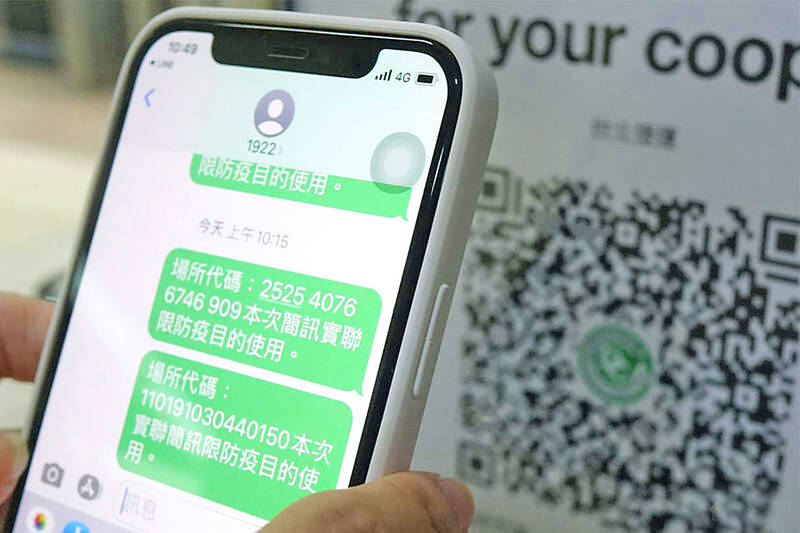About 4.78 billion text messages that people had sent to the Central Epidemic Command Center (CECC) as part of the nation’s COVID-19 prevention efforts have been deleted, the National Audit Office said on Friday.
The center had asked people to send it a message with location data when entering stores and other widely frequented places from 2021 to last year, as it sought to trace the contacts of all confirmed COVID-19 cases.
People were asked to scan a QR code at location entrances, prompting an automatically generated message containing the number that the CECC had assigned to the venue to pop up on their smartphone.

Photo: Chien Li-chung, Taipei Times
Sending the messages to the center’s 1922 hotline was free of charge.
The office said in a statementthat the National Communications Commission (NCC) and telecoms had helped set up databases of the hotline’s location data.
The data helped local health departments trace the movements of people infected with COVID-19 and notify those who had been near them, it said.
About 4.78 billion automatically generated messages had been sent to the hotline from May 2021 to May last year, the office said.
However, the office said that oversight over the database had at times been insufficient.
“In May last year, we found that the National Communications Commission did not check all data storage locations to see whether the text messages were completely deleted, including their main and backup servers,” the office said.
“Some disease prevention agencies accessed text messages in databases using private computers and mobile devices. The messages on the non-governmental devices could still be downloaded even after the government had stopped requiring people to access the 1922 text messages,” it said.
The Executive Yuan’s Cybersecurity Department, which in August last year became the Administration of Cybersecurity under the Ministry of Digital Affairs, at the time failed to conduct an external audit to ensure that messages were completely deleted or destroyed, exposing the data to the risk of being leaked to a third party through improper use, the office said.
After finding the oversight lapses, the office continued to track the progress that agencies made in erasing the text messages, it said.
As of the end of last year, the NCC had terminated its contracts with telecoms, and ensured that databases were closed and no messages were in them, it said.
The CECC also ensured text messages downloaded by local government officials had all been destroyed, the office said.
“The Administration of Cybersecurity has listed management systems for electronic disease prevention data as an item for cybersecurity evaluation,” the office said, adding that the evaluation would “lower the risk of personal data being leaked to third parties.”

Taiwan has received more than US$70 million in royalties as of the end of last year from developing the F-16V jet as countries worldwide purchase or upgrade to this popular model, government and military officials said on Saturday. Taiwan funded the development of the F-16V jet and ended up the sole investor as other countries withdrew from the program. Now the F-16V is increasingly popular and countries must pay Taiwan a percentage in royalties when they purchase new F-16V aircraft or upgrade older F-16 models. The next five years are expected to be the peak for these royalties, with Taiwan potentially earning

STAY IN YOUR LANE: As the US and Israel attack Iran, the ministry has warned China not to overstep by including Taiwanese citizens in its evacuation orders The Ministry of Foreign Affairs (MOFA) yesterday rebuked a statement by China’s embassy in Israel that it would evacuate Taiwanese holders of Chinese travel documents from Israel amid the latter’s escalating conflict with Iran. Tensions have risen across the Middle East in the wake of US and Israeli airstrikes on Iran beginning Saturday. China subsequently issued an evacuation notice for its citizens. In a news release, the Chinese embassy in Israel said holders of “Taiwan compatriot permits (台胞證)” issued to Taiwanese nationals by Chinese authorities for travel to China — could register for evacuation to Egypt. In Taipei, the ministry yesterday said Taiwan

‘LIKE-MINDED PARTNER’: Tako van Popta said it would be inappropriate to delay signing the deal with Taiwan because of China, adding he would promote the issue Canadian senators have stressed Taiwan’s importance for international trade and expressed enthusiasm for ensuring the Taiwan-Canada trade cooperation framework agreement is implemented this year. Representative to Canada Harry Tseng (曾厚仁) in an interview with the Central News Agency (CNA) said he was increasingly uneasy about Ottawa’s delays in signing the agreement, especially as Ottawa has warmed toward Beijing. There are “no negotiations left. Not only [is it] initialed, we have three versions of the text ready: English, French and Mandarin,” Tseng said. “That tells you how close we are to the final signature.” Tseng said that he hoped Canadian Prime Minister Mark Carney

POSITIVE DEVELOPMENT: Japan and the US are expected to hold in-depth discussions on Taiwan-related issues during the meeting next month, Japanese sources said The holding of a Japan-US leaders’ meeting ahead of US President Donald Trump’s visit to China is positive news for Taiwan, former Japan-Taiwan Exchange Association representative Hiroyasu Izumi said yesterday. After the Liberal Democratic Party’s landslide victory in Japan’s House of Representatives election, Japanese Prime Minister Sanae Takaichi is scheduled to visit the US next month, where she is to meet with Trump ahead of the US president’s planned visit to China from March 31 to April 2 for a meeting with Chinese President Xi Jinping (習近平). Japan and the US are expected to hold in-depth discussions on Taiwan-related issues during the